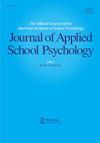Impact of State-Level Changes to School-Based Autism Identification Criteria
IF 1.5
Q4 PSYCHOLOGY, EDUCATIONAL
引用次数: 0
Abstract
Abstract School and medical settings often use different identification criteria for autism spectrum disorder (ASD), a neurodevelopmental disability affecting social-communication, behavioral patterns, and sensory experiences. Further, individual states may use varied definitions for special education eligibility. On January 1, 2019, the State of Oregon began implementing overhauled statewide criteria and evaluation requirements for ASD special education eligibility that directly align with current medical system criteria specified in the Diagnostic and Statistical Manual, Fifth Edition (DSM-5). Immediately following these changes, and then again 1 year later in January of 2020 (prior to the COVID-19 pandemic), we surveyed school-based practitioners across the state about their ASD evaluation practices as well as their knowledge, training, and beliefs regarding the newly revised standards. Our results indicated that practitioners felt more familiar with and had received better training on the new standards after a full year of implementation and that 58% of practitioners had changed their evaluation procedures in some way. However, 74% of practitioners reported that despite these changes, there was no difference in the number of students being found eligible for an ASD diagnosis, indicating that the real-world impact of the statewide policy change might be more limited than initially believed. Limitations and future directions are discussed.州一级对校本自闭症识别标准变化的影响
自闭症谱系障碍(ASD)是一种影响社会沟通、行为模式和感觉体验的神经发育障碍,学校和医疗机构通常使用不同的识别标准。此外,各州对特殊教育资格的定义也各不相同。2019年1月1日,俄勒冈州开始实施全面改革的ASD特殊教育资格的全州标准和评估要求,这些标准和评估要求直接符合《诊断与统计手册》第五版(DSM-5)中规定的现行医疗系统标准。紧接着这些变化,然后在一年后的2020年1月(COVID-19大流行之前),我们对全州的学校从业人员进行了调查,了解他们的ASD评估实践以及他们对新修订标准的知识、培训和信念。我们的结果表明,在实施了整整一年之后,从业人员对新标准感到更加熟悉,并接受了更好的培训,58%的从业人员在某种程度上改变了他们的评估程序。然而,74%的从业人员报告说,尽管有这些变化,但被发现符合ASD诊断条件的学生数量并没有差异,这表明全州范围内政策变化的实际影响可能比最初认为的要有限。讨论了局限性和未来发展方向。
本文章由计算机程序翻译,如有差异,请以英文原文为准。
求助全文
约1分钟内获得全文
求助全文
来源期刊

Journal of Applied School Psychology
PSYCHOLOGY, EDUCATIONAL-
CiteScore
2.40
自引率
10.00%
发文量
7
期刊介绍:
With a new publisher (Taylor & Francis) and a new editor (David L. Wodrich), the Journal of Applied School Psychology will continue to publish articles and periodic thematic issues in 2009. Each submission should rest on either solid theoretical or empirical support and provide information that can be used in applied school settings, related educational systems, or community locations in which practitioners work. Manuscripts appropriate for publication in the journal will reflect psychological applications that pertain to individual students, groups of students, teachers, parents, and administrators. The journal also seeks, over time, novel and creative ways in which to disseminate information about practically sound and empirically supported school psychology practice.
 求助内容:
求助内容: 应助结果提醒方式:
应助结果提醒方式:


